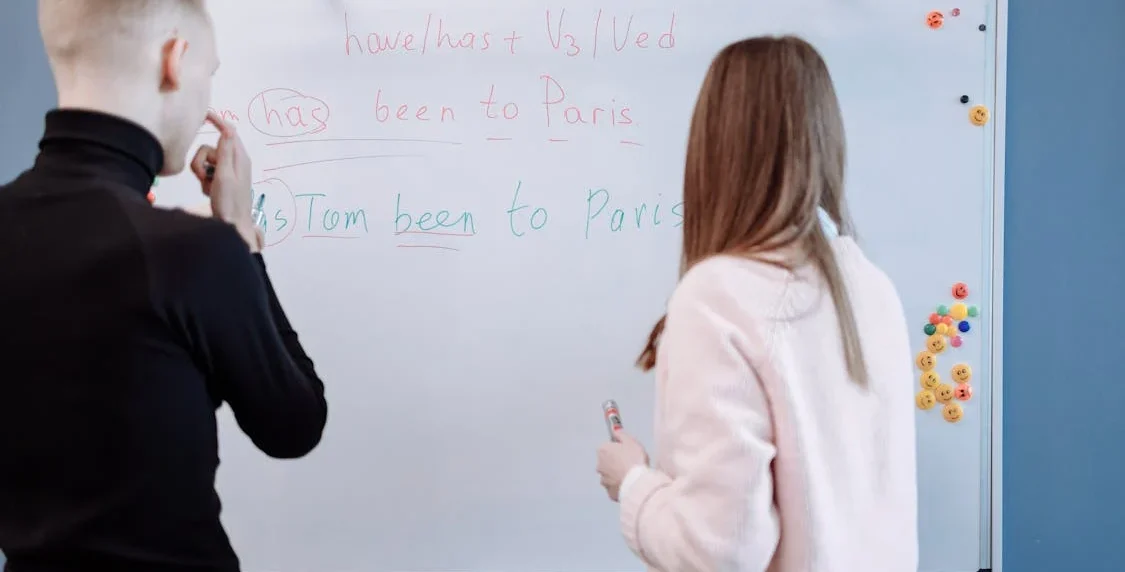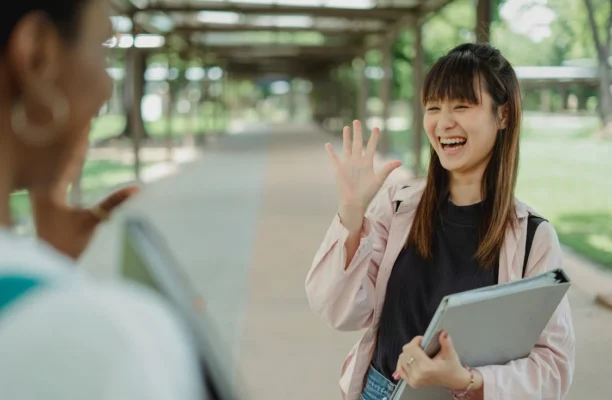1. Present Tenses
1.1 Present Simple
Formula:
- Positive: Subject + Base Verb (add s/es for he/she/it)
- Negative: Subject + do/does not + Base Verb
- Question: Do/Does + Subject + Base Verb?
Examples:
- Positive: I work every day.
- Negative: She does not (doesn’t) like coffee.
- Question: Do they play football?
Usage:
- For habits, routines, or general truths.
Example: The sun rises in the east.
1.2 Present Continuous
Formula:
- Positive: Subject + am/is/are + Verb(-ing)
- Negative: Subject + am/is/are not + Verb(-ing)
- Question: Am/Is/Are + Subject + Verb(-ing)?
Examples:
- Positive: He is studying right now.
- Negative: They are not (aren’t) working today.
- Question: Are you listening?
Usage:
- For actions happening now or around the moment of speaking.
Example: She is cooking dinner.
1.3 Present Perfect
Formula:
- Positive: Subject + has/have + Past Participle
- Negative: Subject + has/have not + Past Participle
- Question: Has/Have + Subject + Past Participle?
Examples:
- Positive: I have finished my homework.
- Negative: He has not (hasn’t) called me yet.
- Question: Have they visited Paris?
Usage:
- For actions completed in the past with a connection to the present.
Example: She has lived in London for five years.
1.4 Present Perfect Continuous
Formula:
- Positive: Subject + has/have been + Verb(-ing)
- Negative: Subject + has/have not been + Verb(-ing)
- Question: Has/Have + Subject + been + Verb(-ing)?
Examples:
- Positive: We have been waiting for an hour.
- Negative: She has not (hasn’t) been studying.
- Question: Have you been exercising?
Usage:
- For actions that started in the past and are still ongoing.
Example: I have been working here since 2010.
2. Past Tenses
2.1 Past Simple
Formula:
- Positive: Subject + Past Verb
- Negative: Subject + did not (didn’t) + Base Verb
- Question: Did + Subject + Base Verb?
Examples:
- Positive: I watched a movie yesterday.
- Negative: She didn’t go to the party.
- Question: Did they visit the museum?
Usage:
- For completed actions in the past.
Example: He played football last weekend.
2.2 Past Continuous
Formula:
- Positive: Subject + was/were + Verb(-ing)
- Negative: Subject + was/were not + Verb(-ing)
- Question: Was/Were + Subject + Verb(-ing)?
Examples:
- Positive: They were sleeping when I called.
- Negative: She was not (wasn’t) watching TV.
- Question: Were you studying last night?
Usage:
- For actions happening at a specific time in the past.
Example: I was reading at 8 PM yesterday.
2.3 Past Perfect
Formula:
- Positive: Subject + had + Past Participle
- Negative: Subject + had not (hadn’t) + Past Participle
- Question: Had + Subject + Past Participle?
Examples:
- Positive: She had left before I arrived.
- Negative: They had not (hadn’t) finished the project.
- Question: Had he studied for the test?
Usage:
- For actions completed before another action in the past.
Example: By the time I arrived, he had already left.
2.4 Past Perfect Continuous
Formula:
- Positive: Subject + had been + Verb(-ing)
- Negative: Subject + had not been + Verb(-ing)
- Question: Had + Subject + been + Verb(-ing)?
Examples:
- Positive: We had been walking for hours when it started to rain.
- Negative: She had not (hadn’t) been practicing.
- Question: Had they been working all day?
Usage:
- For actions ongoing in the past before another action.
Example: He had been studying for two hours before the power went out.
3. Future Tenses
3.1 Future Simple
Formula:
- Positive: Subject + will + Base Verb
- Negative: Subject + will not (won’t) + Base Verb
- Question: Will + Subject + Base Verb?
Examples:
- Positive: I will visit you tomorrow.
- Negative: He won’t attend the meeting.
- Question: Will they come to the party?
Usage:
- For actions in the future.
Example: She will travel to Italy next month.
3.2 Future Continuous
Formula:
- Positive: Subject + will be + Verb(-ing)
- Negative: Subject + will not be + Verb(-ing)
- Question: Will + Subject + be + Verb(-ing)?
Examples:
- Positive: We will be waiting for you at 5 PM.
- Negative: He won’t be coming with us.
- Question: Will you be staying there overnight?
Usage:
- For ongoing actions at a specific time in the future.
Example: I will be working at 10 AM tomorrow.
3.3 Future Perfect
Formula:
- Positive: Subject + will have + Past Participle
- Negative: Subject + will not have + Past Participle
- Question: Will + Subject + have + Past Participle?
Examples:
- Positive: She will have finished her homework by 8 PM.
- Negative: They won’t have completed the task on time.
- Question: Will he have arrived by then?
Usage:
- For actions completed before a specific time in the future.
Example: By next year, I will have graduated.
3.4 Future Perfect Continuous
Formula:
- Positive: Subject + will have been + Verb(-ing)
- Negative: Subject + will not have been + Verb(-ing)
- Question: Will + Subject + have been + Verb(-ing)?
Examples:
- Positive: By 6 PM, I will have been waiting for two hours.
- Negative: She won’t have been working there for long.
- Question: Will they have been studying all night?
Usage:
- For ongoing actions that will continue up to a point in the future.
Example: By December, she will have been living here for three years.
Quick Summary Table
| Tense | Formula | Example |
| Present Simple | Subject + Base Verb | I play football. |
| Past Simple | Subject + Past Verb | I played football yesterday. |
| Future Simple | Subject + will + Base Verb | I will play football tomorrow. |
| Present Continuous | Subject + am/is/are + Verb(-ing) | I am playing football now. |
| Past Continuous | Subject + was/were + Verb(-ing) | I was playing football at 5 PM. |
| Future Continuous | Subject + will be + Verb(-ing) | I will be playing football then. |
| Present Perfect | Subject + has/have + Past Participle | I have played football many times. |
| Past Perfect | Subject + had + Past Participle | I had played football before lunch. |
| Future Perfect | Subject + will have + Past Participle | I will have played by tomorrow. |
| Present Perfect Continuous | Subject + has/have been + Verb(-ing) | I have been playing for 2 hours. |
| Past Perfect Continuous | Subject + had been + Verb(-ing) | I had been playing before it rained. |
| Future Perfect Continuous | Subject + will have been + Verb(-ing) | I will have been playing for 3 hours. |



Leave your comment
You must be logged in to post a comment.